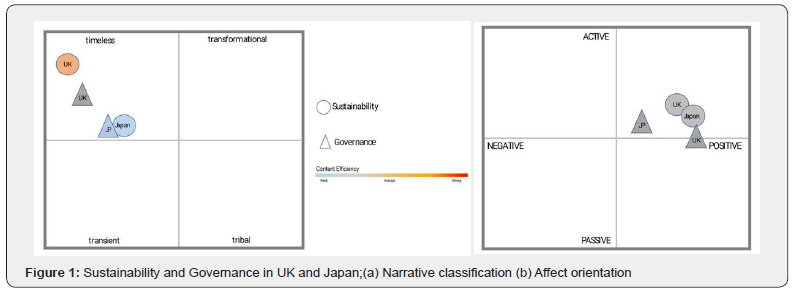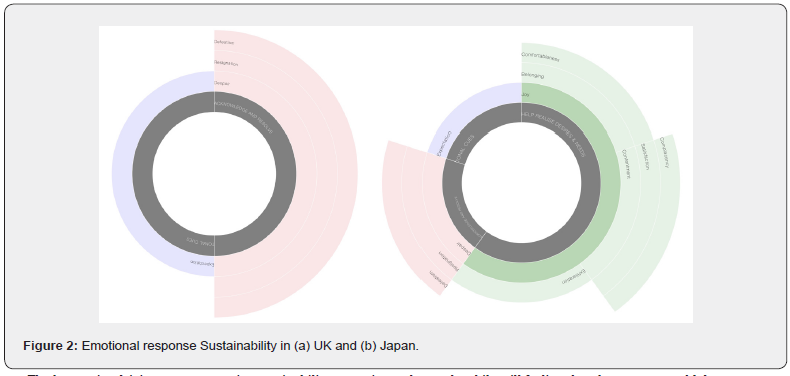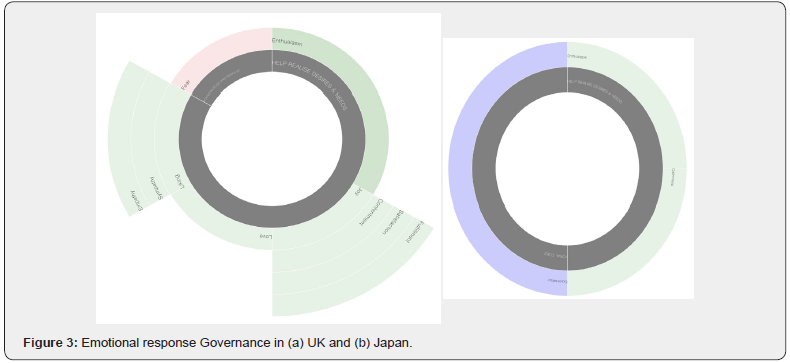Sustainability & Governance
Chris D Beaumont1*, Darrell Berry2 and John Ricketts3
1 Institute for Future Initiatives, LifeStylebyDesign, The University of Tokyo, Japan
2 Significance Systems, Brighton, UK
2 Significance Systems, Sydney NSW 2069, Australia
Submission: May 31, 2022; Published: June 17, 2022
*Corresponding author: Chris D Beaumont, Institute for Future Initiatives, LifeStylebyDesign, The University of Tokyo, 7-3-1 Hongo, Bunkyo-ku, Tokyo 113-0033, Japan
How to cite this article: Chris D Beaumont, Darrell Berry, John Ricketts. Sustainability & Governance. Int J Environ Sci Nat Res. 2022; 30(3): 556287. DOI: 10.19080/IJESNR.2022.30.556287
Keywords: Narratives; Utility; Social sharing; Engagement; Behaviour; People; Big data; AI; Important; Emotional response; Improved decisions; Ethics; ESG; Sustainability; Corporate Governance
Context
Despite the increasing popularity of ESG investing there remains an operational trade-off, for many leaders, of business growth versus sustainability, with many opting for the known and inflexible to other approaches; for example, Net Positive [1]. That said, ESG is unlikely to go away as the necessity of materiality standards gain acceptance and provide new granularity to governance. No one doubts the need for improved corporate responsibility. However, the jury is out on whether ESG is something that is practical and can provide meaningful metrics that discriminate the good from the bad. The answer would be yes if the principles of sustainability were central to the company’s business strategy. Furthermore, it is now possible to ‘engage with engagement’ and leverage the strongest stories and focus on the strong narratives in a relevant and credible manner.
Sustainability and Governance
Here we consider the UK and Japan, in both counties, both Sustainability and Governance narratives are timeless. For both narratives, the content efficiency is better in the UK, and they are currently more relevant than in Japan (Figure 1). Being timeless they are authentic and matter to people, characterized by long-term, deep engagement, driven by a small number of key players who are often experts and authorities. The emotional response (affect orientation) of these narratives is positive and generally active. Most narratives being transient do not rouse any emotional response.

In the UK and Japan, the nature of the emotional response (Figure 2). In such a diagram, positive emotions are highlighted in green, whereas negative emotions are red. If there is a clear tonality to the emotions expressed, such as expectation or apprehension, these are shown in purple. The intensity of the colour indicates the intensity of each emotion. The width of each arc reflects the degree to which the named emotion contributes to the overall emotional response. Broad emotions, such as fear and love, are closer to the centre of the chart. The more subtle emotions, which add to those broad emotions, are shown in the concentric rings further out. Moving out from the centre, each ring shows a further level of granularity. Identifying these primary emotions is critical especially at times of deep feeling when often people react on impulse rather than by rational objective.

The key topics driving engagement in sustainability are quite distinct; a measure not so much of differing cultures, rather distinct business practices, reflected by the maturity and visibility of the public debate. Regarding sustainability the emotions in the UK are negative or forward looking with some expectation. In contrast in Japan, positive emotions dominate, reflective of society’s willingness to comply with daily regulations. It is no surprise there is greater emotional warmth towards sustainability.
The negative engagement in the UK is wholly due to the current business stance, which is seen as a problem. While, in Japan, the key topics driving sustainability engagement are broader and positive including specific actions as well as broader awareness of the earth, while still feeling that the country could do more.
In respect of the governance narrative, the situation is rather reversed, with positive feelings dominating in the UK after recent public debate, COP26,…, different from how the issue of governance (Figure 3) is currently viewed. It is more work in progress, with expectations of future progress and the key driver of engagement being government and improved transparency / information. In the UK, the topics currently driving engagement are more diverse and pragmatic / operational than those in Japan. There the focus is more macro in respect of regulatory requirements, the powers of the state to exercise action and improved compliance.

In Japan, the governance narrative has a positive sense of expectation with, yet no detailed focus on ethical and cultural considerations regarding governance, despite the revision in June 2021 of Japan’s Corporate Governance Code, which largely focused on improving diversity and sustainability planning, as well as fostering independent board members. The rapid popularity of the notion of ESG in Japan, needs for some, the G to be addressed as a board priority to enable material E and S activities. Hokugo [2], Director of Corporate Governance at Japan’s Pension Fund Association, feels “Japan needs more attention to substance rather than just appearance”.
Results and Discussion
Transitional times bring with them critical uncertainties. Trust is a critical element of success. When times are uncertain and media is unregulated, or new, then trust is harder to create. All businesses have access to the same information. What sorts the winners from the losers is not access to information but use of information. The current paradox is with more information, readily available, people do not feel better informed rather there is an increasing concern about what information is correct. They trust people in their tribe / community. Significantly, engagement and trust come from meaningful and relevant narratives, not just facts. People have always trusted well told stories that are meaningful to them. Going forward creating trusted narratives will define future success as we move into an uncertain future. Social media and social sharing have enabled narratives to readily spread and influence people’s attitudes and behavior; winners will create their own futures.
Fortunately, one can track narratives, with different characteristics and expressions, so that one can engage with significant stories, in a relevant and credible way. With trust in traditional institutions at an all-time low, the ability to connect and communicate to address societal challenges, by understanding what is important to people is critical to bring about behavioral change, at scale. Appreciating what is important to people aids leaders, policy makers and educators to engage with their audiences in a relevant, evocative, and effective manner. What is critical, especially, during changing times, is a need to ensure that your story maintains a relevance in content and emotion, to ensure you resonate and your message is embraced.
References
- Polman P, Winston A (2022) Yes, Investing in ESG pays off, HBR, April.
- Hokugo K, quoted by Lai K (2022) Japan’s TSE changes must go further on corporate governance, International Financial Law Review, Corporate, May 11th.






























